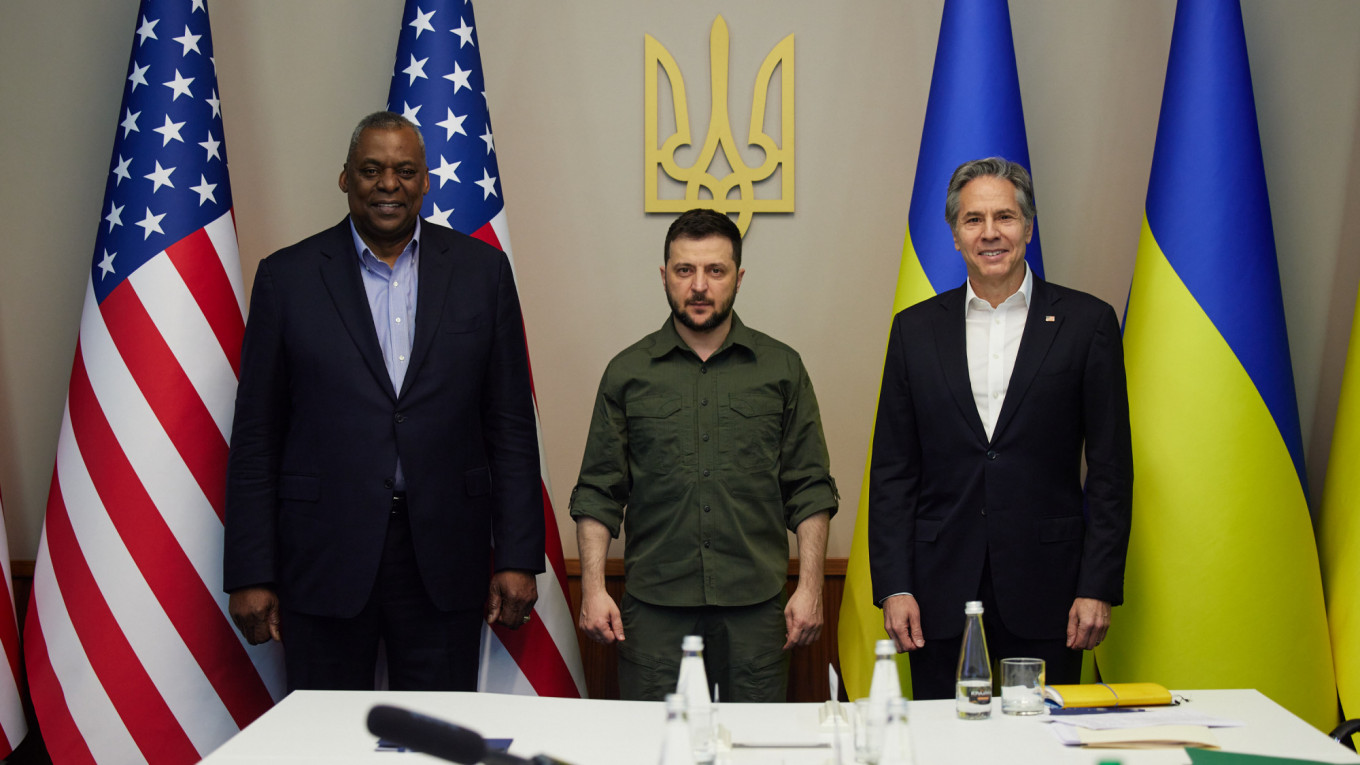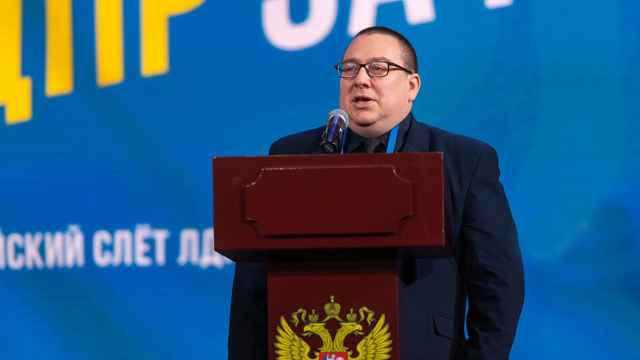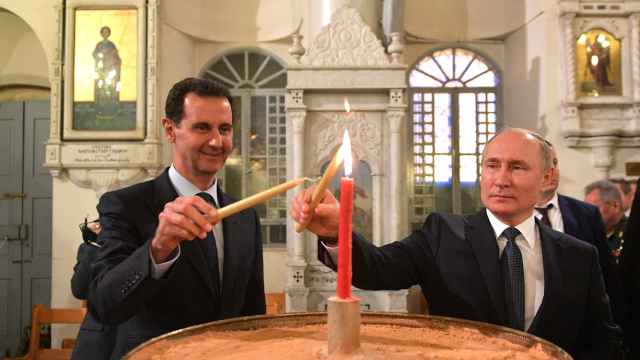The United States believes Kyiv can win the war against Russia if it has the "right equipment," Pentagon chief Lloyd Austin said Monday, as strikes on railway infrastructure in the central Ukraine killed at least five.
A landmark visit by Austin and Secretary of State Antony Blinken to Ukraine came as the war entered its third month, with thousands killed and millions displaced by the fighting.
The bloody conflict has triggered an outburst of support from Western nations that has seen a deluge of weapons pour into Ukraine to help beat back the Russian invaders.
"The first step in winning is believing that you can win. And so they believe that we can win," Austin told a group of journalists after he and Blinken met Ukrainian President Volodymyr Zelensky.
"We believe that we can win, they can win if they have the right equipment, the right support."
The meeting between the two sides lasted three hours and was "very productive and detailed", according to a Pentagon spokesman, adding that Zelensky was also briefed on a security summit in Germany on Tuesday among Western allies.
Following the talks, Austin said the U.S. hoped the Russian military would be exhausted in Ukraine, preventing it from launching further invasions.
"We want to see Russia weakened to the degree that it can't do the kinds of things that it has done in invading Ukraine," said Austin.
For months, Zelensky has been begging for heavy weapons -- including artillery and fighter jets -- from Western countries, vowing his forces could turn the tide of the war with more firepower.
The calls appear to be resonating now, with a host of NATO countries pledging to provide a range of heavy weapons and equipment to Ukraine, despite protests from Moscow.
The U.S. has been a leading donor of finance and weaponry to Ukraine and a key sponsor of sanctions targeting Russia, but had not yet sent any top officials to Kyiv, while several European leaders have travelled there to underscore their support.
"Many countries are going to come forward and provide additional munitions and howitzers. So we're going to push as hard as we can, as quickly as we can, to get them what they need," Austin later said in reference to Tuesday's summit in Germany.
Austin and Blinken also said U.S. diplomats will begin a gradual return to Ukraine this week and announced $700 million (653 million euros) in additional military aid.
Ceasefire
The highly sensitive trip by two of President Joe Biden's top cabinet members came as fighting continued across swathes of Ukraine, casting a long shadow over Easter celebrations in the largely Orthodox country.
Following a weekend full of fighting, at least five people were killed and another 18 injured on Monday after a Russia rocket attack targeted railway infrastructure in the central Ukraine region of Vinnytsia.
"Rescue operations are under way, investigators, prosecutors and other services are working at the scene," the office of the Ukrainian prosecutor general said in a statement on social media.
Russian forces have been widely accused of targeting civilian infrastructure throughout the Kremlin's two-month military assault on its pro-democratic neighbour, allegations Moscow denies.
The attacks came as Russia's defence ministry announced a ceasefire around the sprawling Azovstal steel plant in Mariupol, following calls over the weekend to pause fighting to allow civilians to leave.
Ukraine says hundreds of its forces and civilians are holed up inside Azovstal, and Kyiv has repeatedly called for a ceasefire to allow civilians to safely exit the shattered city.
Russian troops "from 14:00 Moscow time (1100 GMT) on April 25, 2022, will unilaterally stop any hostilities, withdraw units to a safe distance and ensure the withdrawal of" civilians, the defence ministry said in a statement.
It said the civilians will be taken "in any direction they have chosen" and added that the Ukrainian side should show "readiness" to start the humanitarian evacuations "by raising white flags" at Azovstal.
Hours later, Ukraine countered the announcement, saying Moscow had not agreed to its request for a humanitarian corridor to let wounded soldiers and civilians leave Azovstal.
"Unfortunately, there are no agreements on humanitarian corridors from Azovstal today," Deputy Prime Minister Iryna Vershchuk said on Telegram.
"It is important to understand that the humanitarian corridor is opened by agreement of both parties. The corridor announced unilaterally does not provide security, and therefore, in fact, is not a humanitarian corridor," Vershchuk added.
The ceasefire debacle comes a day after Kyiv said it had invited Moscow to hold talks near the steel plant, after an attempt to evacuate civilians over the weekend was thwarted by Russian forces, according to Ukrainian officials.
Last week, Russian President Vladimir Putin ordered his forces not to assault the plant, but the Ukrainians say that attacks from the land, sea and air continue to rain down on the steel works unabated.
'No water, no food'
A video posted by the far-right Azov Regiment, whose fighters are based in Azovstal, showed war-weary women and children sheltering in the plant's underground bunkers, pleading for relief.
"There are 600 people here. No water, no food. What are we going to do here? How long will we stay here?" asked one woman.
"We haven't been out for two months now. I don't even know what the weather is like there. It feels like it's still February 28," said another woman.
Mariupol, which the Kremlin claims to have "liberated", is pivotal to Russia's war plans to forge a land bridge to Russian-occupied Crimea -- and possibly beyond, as far as Moldova.
A Message from The Moscow Times:
Dear readers,
We are facing unprecedented challenges. Russia's Prosecutor General's Office has designated The Moscow Times as an "undesirable" organization, criminalizing our work and putting our staff at risk of prosecution. This follows our earlier unjust labeling as a "foreign agent."
These actions are direct attempts to silence independent journalism in Russia. The authorities claim our work "discredits the decisions of the Russian leadership." We see things differently: we strive to provide accurate, unbiased reporting on Russia.
We, the journalists of The Moscow Times, refuse to be silenced. But to continue our work, we need your help.
Your support, no matter how small, makes a world of difference. If you can, please support us monthly starting from just $2. It's quick to set up, and every contribution makes a significant impact.
By supporting The Moscow Times, you're defending open, independent journalism in the face of repression. Thank you for standing with us.
Remind me later.






